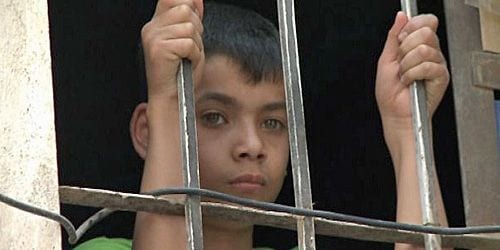
On top of everything, I have moody teenagers.
— Mohamed Wael
“You won’t all fit,” says Husham Al-Dhbe, watching little boys trying to sort out where they’ll sleep. “Some sleep on the bed, the rest on the floor.” He sits on a lower bunk bed, the top bed nearly touching his head, and he listens to the kids make their case, that they can all fit, if only they slide in tight next to one another. We watch him watch, we see how he absorbs their needs and also tries to frame them, so the boys see that everyone has needs. He asks why one child isn’t going to sleep. “There isn’t enough room,” comes the answer.
Husham touches his chin, and almost smiles. The boys in the two-bedroom rented house in Baghdad’s notorious Ali Sadr neighborhood can be a handful, but, as this scene in the documentary In My Mother’s Arms reveals, he remains patient with them, pleased that he can provide them with a home and a family, of sorts, following the trauma they’ve endured. Memories of chaos and violence are fresh in their minds, even for those who’ve been living at the orphanage for months and years. They are learning to support and to teach each other, as they find so much turmoil everywhere else.
To present their complex emotional lives, Mohamed Jabarah Al-Daradji and Atia Jabarah al-Daradji’s film is at once gently subjective and, at times, utterly harrowing, showing the confusion they feel but have hard times communicating, as well as Husham’s efforts to reshape their daily experience, to find funding for the orphanage and to provide order for his kids. It splits its focus among Husham and several boys, including seven-year-old Saif Slaam. Newly arrived at the orphanage, he’s having a hard time adjusting to a keeping to a schedule, to sharing, to trusting. His eyes wide and red from crying, he’s hurt when other boys call him “Majuda,” his mother’s name. He can’t even remember his mother, he says, only his brothers.
Saif doesn’t say much else at the start of In My Mother’s Arms. But if the boy’s experience seems beyond words, this remarkable documentary — opening 8 October at Maysles Cinema — makes clear what’s at stake, for him and for the 31 other orphans living with him now. The war in Iraq has produced some 800,000 orphans, an early title card asserts, and precious little capacity to care for them. Husham has no government support for the home. Instead, he must cobble together monies from neighbors and local businesses, each week another adventure in soliciting. Husham’s wife resents that he spends so much time at the orphanage, because, she points out, his own young son and daughter hardly see him. And when he consults a doctor for advice on how to deal with the boys’ “emotional problems,” he’s told he should provide female caretakers, to “create a family atmosphere at the orphanage.” This is pretty much impossible, however: the only volunteers he’s found are six men. “We offer the best we can,” he says.
That best includes convincing a local theater director, Mr. Kathem, to help the boys perform in a play about lost mothers, an activity he hopes will serve as a distraction but also an outlet, a way for the children to “get their feelings out.” As the kids begin to work on learning lines and playing music, they find in each other reflections of their own anguish.
For all the pain so visible in the children’s faces, In My Mother’s Arms offers hope. In part, this emerges in relationships among the boys: Saif finds a friend and music teacher in Mohamed Wael, a former swim team champion, now a teenager feeling afraid. The film keeps close on the boy’s face when Husham scolds him for teasing Saif at first, for not remembering his own past, how he felt when he lost his parents. “This year is a very important year for you,” Husham suggests, “You’re mature and you understand.” The film doesn’t delineate what he’s supposed to understand, how a boy who’s lost everything might imagine helping other boys who have also lost everything, or how they might manage frustration and fear and resentment and rage.
Instead, it offers impressions, moments almost missed, images of eyes opening and worries allayed, however briefly. When Saif is invited to join in the play, he resists at first. For days he lies on the floor or cries or fights, his incredible eyes sometimes tearful, sometimes startled, always searching. At last Saif agrees to participate — moved in part by watching the other boys working together. When he takes the stage, the audience members, all neighbors in the same grim neighborhood, are tearful, and then enthusiastic, applauding the performance.
This idea of performance is key, as the movie again and again positions you in relation to the children trying to recreate themselves and Husham observes and encourages, watching carefully and trying to make the world make sense for them, even as he can’t possibly. That they all find their way toward a performance of order is a first step out of past, incessantly haunting trauma and into belief in a future, where they might act like they’re part of a family, and then feel that part too.

![Call for Papers: All Things Reconsidered [MUSIC] May-August 2024](https://www.popmatters.com/wp-content/uploads/2024/04/all-things-reconsidered-call-music-may-2024-720x380.jpg)



